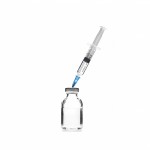Generic Name: enfuvirtide
Pronunciation: FEW-zee-on
Abbreviation: ENF
Drug Class: Entry Inhibitors
Company: Genentech, a division of Roche
Approval Status: Approved
Generic Version Available: No
Experimental Code: T-20
Drug Indication
Not part of a recommended or alternative treatment regimen for antiretroviral-naive people living with HIV, according to the U.S. Department of Health and Human Services (DHHS) Panel on Antiretroviral Guidelines for Adults and Adolescents. Generally reserved for for treatment-experienced people living with HIV. Visit http://aidsinfo.nih.gov/contentfiles/lvguidelines/aa_recommendations.pdf for the full DHHS guidelines.
General Info
Fuzeon is an HIV medication. It is in a category of HIV medicines called entry inhibitors. Fuzeon was approved by the U.S. Food and Drug Administration for use by people living with HIV in March 2003.
Fuzeon is approved for HIV-positive people who have tried other HIV drugs in the past and are unable to keep their viral loads undetectable. It has not been approved for HIV-positive people who are starting HIV drug treatment for the first time.
Fuzeon must be used in combination with other HIV drugs.
Dosage
Adult Dose: One 90mg (1-ml solution) subcutaneous injection twice a day.
Pediatric Dose: Age 6 to 16 years: 2 mg twice a day, maximum dose of 90 mg twice a day
Dosing Info: Take with or without food. Fuzeon comes as a white powder that must be mixed with sterile water in a vial each day.
Side Effects
Injection site reactions–pain, discomfort, hardened skin, redness, bumps, itching and swelling at the Fuzeon inject sites–have been the most common side effect reported in studies. Reactions may include pain and discomfort, hardened skin, redness, bumps, itching and swelling.
In clinical trials, patients taking Fuzeon with other HIV medicines got bacterial pneumonia more often than patients not receiving Fuzeon. It is unclear if this was related to the use of Fuzeon. You should contact your healthcare provider right away if you have a cough, fever or trouble breathing.
Although very rare, allergic reactions have been seen with Fuzeon and can occur again the drug is restarted. Symptoms can include rash, fever, nausea, vomiting, chills, shaking, low blood pressure and increased liver enzymes.
Other side effects may occur as a result of taking Fuzeon, including peripheral neuropathy, insomnia, depression, decreased appetite, fatigue, muscle pain, constipation, and pancreas problems.
Drug Interactions
For a review of drug interactions, including prescription and over-the-counter medications and supplements that should not be taken with Fuzeon or may require dose adjustments, consult the Fuzeon package insert: http://www.gene.com/download/pdf/fuzeon_prescribing.pdf
Other Info
Before taking this medication, tell your doctor if you have kidney disease or liver disease. In addition, tell your doctor if you are pregnant or planning to become pregnant, if you are breastfeeding, and all your medical conditions, including all prescription and over-the-counter medications and supplements you are taking.
For More Info: http://www.gene.com/download/pdf/fuzeon_prescribing.pdf
Co-Pay Program Info: https://www.poz.com/basics/hiv-basics/drug-assistance-programs
Patient Assistance Program Info: https://www.poz.com/basics/hiv-basics/drug-assistance-programs
Last Reviewed: July 15, 2016






